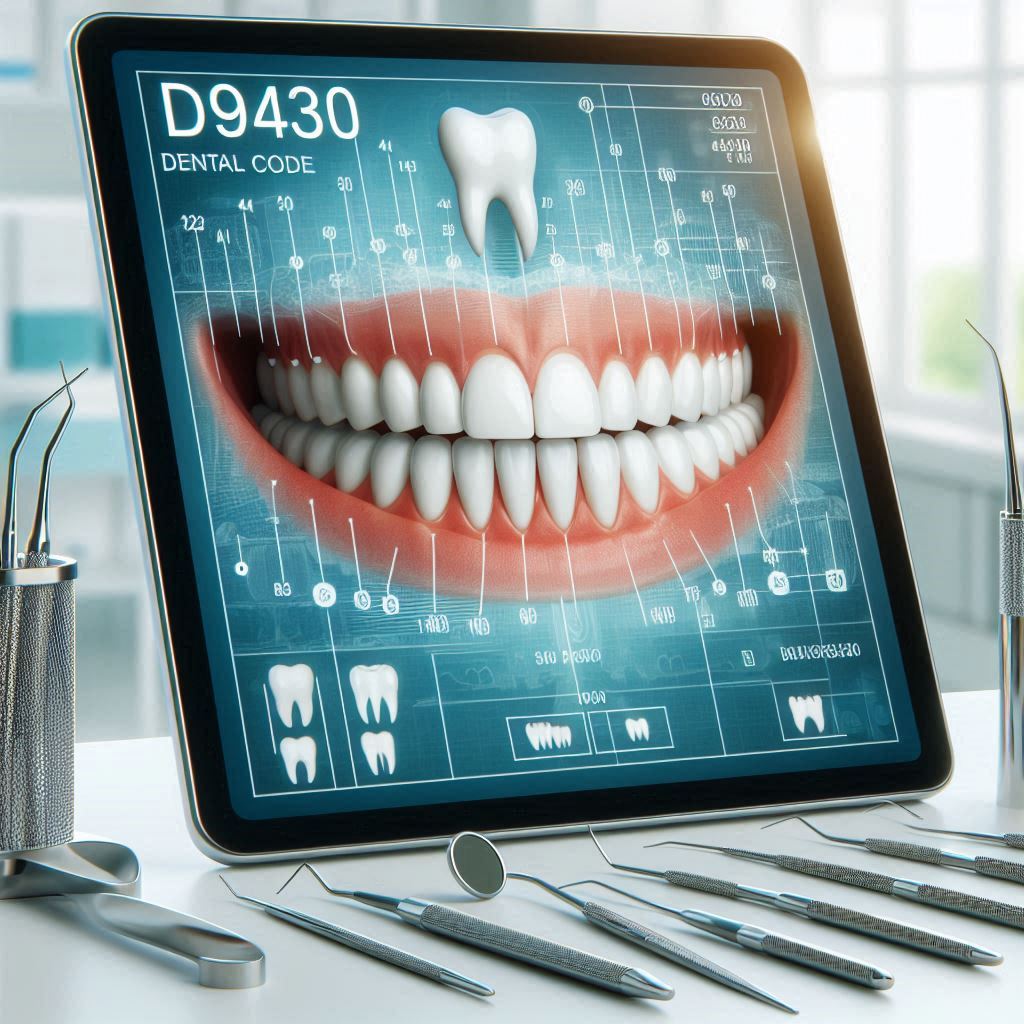Understanding the D9430 Dental Code
Navigating dental billing codes can be overwhelming for both patients and dental professionals. One code that often raises questions is D9430, which refers to office visits for observation or assessment following dental treatment. Unlike procedural codes (such as fillings or extractions), D9430 is an evaluation code, meaning it’s used when a patient returns for a follow-up visit without additional treatment.
This article provides an in-depth exploration of the D9430 dental code, including its purpose, insurance implications, documentation requirements, and ethical considerations. Whether you’re a dental practitioner seeking clarity on billing or a patient curious about your dental statement, this guide will help demystify D9430.

2. What Is the D9430 Dental Code?
The D9430 code is part of the Current Dental Terminology (CDT) maintained by the American Dental Association (ADA). It is defined as:
“Office visit for observation (during regularly scheduled hours) – no other services performed.”
This means it is used when a patient returns to the dentist for a follow-up evaluation after a procedure, but no additional treatment is provided during that visit.
Key Characteristics of D9430:
- Non-procedural – No active treatment is performed.
- Assessment-focused – Used for monitoring healing, post-op checks, or evaluating treatment success.
- Time-based – Typically covers a short visit (10-15 minutes).
3. Purpose and Importance of the D9430 Code
The D9430 code serves several critical functions in dental practice:
A. Ensuring Proper Post-Treatment Care
Many dental procedures (e.g., extractions, root canals, implants) require follow-up visits to monitor healing. Using D9430 ensures these visits are properly documented and billed.
B. Preventing Unnecessary Procedures
Instead of charging for a full exam (D0120), dentists use D9430 when only a brief check-up is needed, saving patients money.
C. Insurance and Billing Accuracy
Proper use of D9430 helps avoid claim denials by clearly indicating that the visit was for observation only.
4. When Is the D9430 Code Used?
D9430 is appropriate in various scenarios, including:
| Scenario | Example |
|---|---|
| Post-Surgical Check-Up | Monitoring healing after tooth extraction. |
| Medication Follow-Up | Assessing response to antibiotics or pain management. |
| Prosthesis Adjustment | Checking denture fit without adjustments. |
| Infection Monitoring | Evaluating swelling or infection after treatment. |
When NOT to Use D9430:
- If additional treatment (e.g., suturing, medication adjustment) is provided, a different code should be used.
- If the visit includes X-rays or diagnostic tests, a comprehensive exam code (D0140/D0150) may apply.
5. Differences Between D9430 and Other Dental Codes
Understanding how D9430 differs from similar codes prevents billing errors.
| Code | Description | Key Difference |
|---|---|---|
| D0120 | Periodic oral evaluation | Full exam, not just observation. |
| D0140 | Limited oral evaluation | Problem-focused, may include diagnostics. |
| D0150 | Comprehensive oral evaluation | Extensive exam, often for new patients. |
| D9430 | Office visit for observation | No treatment performed. |
6. Insurance Coverage and Reimbursement for D9430
Insurance policies vary in how they handle D9430:
- Some insurers cover it fully as part of post-op care.
- Others may deny it, considering it part of the original procedure’s global period.
- Medicare/Medicaid often has specific rules for observation visits.
Tips for Maximizing Reimbursement:
✔ Document clearly – Note the reason for the visit and lack of treatment.
✔ Verify coverage – Check with the insurer before billing.
✔ Use modifiers if needed – Some insurers require modifiers like “-AT” (acute treatment).
7. Common Misconceptions About D9430
- ❌ Myth: D9430 is a “free” visit.
✅ Fact: It’s a billable service, though some dentists waive fees for loyal patients. - ❌ Myth: It’s the same as a regular check-up.
✅ Fact: It’s strictly for observation, not preventive care.
8. How Dentists Document and Bill D9430
Proper documentation is crucial for compliance and reimbursement:
Required Notes in Patient Records:
- Reason for the visit (e.g., “Post-op check for tooth #19 extraction”).
- Findings (e.g., “Healing well, no signs of infection”).
- Confirmation that no treatment was performed.
Billing Process:
- Enter D9430 on the claim form.
- Attach supporting notes if required.
- Submit to insurance with any necessary modifiers.
9. Patient Considerations: What You Should Know
- Ask your dentist why a D9430 visit is needed.
- Check insurance benefits to avoid unexpected charges.
- Follow post-op instructions to minimize unnecessary visits.
10. Legal and Ethical Aspects of Using D9430
- Upcoding (using a higher-paying code unnecessarily) is fraud.
- Undercoding (not billing for legitimate visits) harms practice revenue.
- Transparency with patients builds trust.
11. Case Studies and Real-World Applications
Case Study 1: Post-Extraction Follow-Up
A patient returns 3 days after a wisdom tooth extraction. The dentist checks for dry socket but performs no treatment. D9430 is billed correctly.
Case Study 2: Insurance Denial Appeal
A claim for D9430 is denied. The office submits supporting clinical notes, leading to successful reimbursement.
12. Future Trends in Dental Coding
- AI-assisted coding may reduce errors.
- More insurers may standardize D9430 coverage.
- Tele-dentistry could introduce new observation codes.
13. Conclusion
The D9430 dental code is essential for post-treatment monitoring, ensuring proper billing and patient care. Dentists must document visits accurately, while patients should understand their insurance coverage. As dental coding evolves, clarity on D9430 will remain crucial for efficient practice management.
14. FAQs
Q1: Is D9430 covered by all dental insurance plans?
A: No, coverage varies. Always verify with your insurer.
Q2: Can a dentist charge me for a D9430 visit?
A: Yes, unless they offer it as a complimentary follow-up.
Q3: How often can D9430 be billed for the same procedure?
A: Typically once per post-op period, unless complications arise.
Q4: What should I do if my insurance denies a D9430 claim?
A: Ask your dentist to appeal with detailed documentation.


